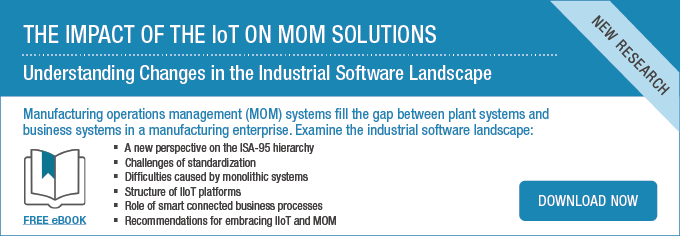 When it comes to management systems and continuous improvement programs, Lean Manufacturing is one of the most widely used today. In fact, our 2013 Manufacturing Operations Management (MOM) survey revealed that three in every ten senior leaders had a Lean program in place or planned to within a year. This was the most chosen response, in front of ISO 9001, Operational Excellence, Six Sigma, and more.
When it comes to management systems and continuous improvement programs, Lean Manufacturing is one of the most widely used today. In fact, our 2013 Manufacturing Operations Management (MOM) survey revealed that three in every ten senior leaders had a Lean program in place or planned to within a year. This was the most chosen response, in front of ISO 9001, Operational Excellence, Six Sigma, and more.
Despite its prevalence, initiating and then sustaining a Lean Manufacturing strategy can be a daunting task, typically requiring cultural and business process transformation. To gain some perspective, we recently spoke with Eric Pope, VP of Operations at tier 1 oil and gas supplier and 2011 Shingo Prize winning US Synthetic. Pope was a pioneer in US Synthetic’s Lean initiative back in 2004, and leads the ever-evolving journey today.
In this post, we’ll share seven lessons we took from our conversation with Pope on how to effectively implement and execute on a Lean Manufacturing strategy. Although there are valuable insights within each of these lessons, it’s important to remember that each organization faces a unique situation and there’s a wide range of thought when it comes to Lean. We’ll be writing more on this topic in the future.
1. Align Your Lean Manufacturing Goals with Your Business Goals Up Front
The misalignment of goals is often the reason for failed initiatives. What happens on the shop floor is no exception. When starting your Lean journey, make sure to clearly define what success means for the overall business and then align your Lean goals as well as resources with them. As Pope explained, “When you separate Lean from the business it almost never gets traction.”
2. Lean is about Running “Experiments” to See What Works and What Doesn’t
You don’t need years of experience with Lean to deploy a successful Lean strategy. Well before winning the Shingo Prize, Pope and US Synthetic’s now-CEO Rob Galloway were “an R&D guy and a production manager” with an idea. What you do need is a culture of personnel capable of experimenting with new ways for executing processes the ability to make continuous improvement adaptations on the fly.
3. Leverage Third-Party Expertise as an Accelerator rather than a Crutch
Pope acknowledged that external consultants can be beneficial to your Lean strategy, but he warns that they should be used in the right way. Every Lean journey needs a leader and that person has to come from within. Pope said, “The best consultants are the ones that can enable skill—even multiply skill—very quickly and then get out. If they’re not doing that, then they’re just holding the organization back.”
4. Starting a Lean Journey is Different from Maintaining One in Progress
At the start of a Lean journey, there’s more of a set of principles to go by rather than a formalized process. But Pope explained that “bringing people on during your lean journey requires a whole different methodology.” As time goes on and new employees come on board, it’s important to start developing a scalable structure around how Lean should be taught and then applied.
5. Make Every Employee Not Just a Lean Practitioner but a Lean Leader
Lean is very much-so a mindset. Professionals that have bought into Lean generally find themselves applying its principles without blinking an eye. Where it starts becoming astronomically more powerful, however, is when that mindset pervades across the organization. And for that to happen, Pope said employees need “not only have the skills to apply Lean tools, but also the capability to teach them.”
6. Empowered Employees are Better for Business
Many leaders approach Lean with this type of mentality: “We need to implement Lean so we can cut costs.” While that’s a noble goal, it doesn’t necessarily drive much long-term business value. Pope offers up an alternative set of advice. His approach to lean has been to focus on developing better, more capable employees, and then to let that be the driver of other operational and business benefits.
7. The Lean Manufacturing Journey is a Continuous Improvement Journey
Some leaders overthink the initiation of the Lean journey, assuming it can only begin once a robust plan is in place. But for many businesses—case in point, US Synthetic—it starts out as nothing more than an experiment. Refinement, calibration, and organizational buy-in are all part of the journey. When executed effectively, Lean can be self-sustaining, self-validating and should scale and mature organically. And, as mentioned, sometimes it can even be accelerated by leveraging third-party expertise.
People: The Key to a Successful Lean Manufacturing Journey
Since starting its Lean “experiments” back in 2004, US Synthetic has captured 50% of the market share, up from 20%. The company has also improved productivity by 106%. While many changes have taken place over the years, one thing that’s remained consistent is Pope’s focus on using Lean as a means for building better employees rather than diverting attention to the prospect of other short term gains.
He said, “If you follow that formula and engrain it into your employees’ way of thinking— solving problems over time—your business is going to grow. Everything in our lean journey has been about 'How do I improve value for the customer?' not 'How do I improve costs?' and that has been our biggest driver of success.”
